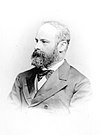Ambassador of the Federal Republic of Germany
| Name | Image | Term Start | Term End | Notes |
|---|---|---|---|---|
| Kurt Sieveking |  | 1951 | 1953 | Consul General |
| Herbert Siegfried | 1954 | 1958 | ||
| Hans-Ulrich von Marchtaler | 1958 | 1961 | ||
| Karl Werkmeister | 1961 | 1963 | ||
| Hans Ulrich Granow | 1963 | 1964 | ||
| Gustav von Schmoller |  | 1964 | 1968 | |
| Adolf Max Obermayer | 1968 | 1972 | ||
| Heinz Dietrich Stoecker | 1972 | 1976 | ||
| Heinz Voigt | 1976 | 1978 | ||
| Joseph J. Thomas | 1978 | 1981 | ||
| Jesco von Puttkamer | 1981 | 1984 | ||
| Gerhard Ritzel | 1984 | 1988 | ||
| Reinhold Schenk | 1988 | 1992 | ||
| Harald Hofmann | 1992 | 1997 | ||
| Klaus-Hellmuth Ackermann | 1998 | 2001 | ||
| Bernd von Waldow | 2001 | 2003 [2] | ||
| Busso von Alvensleben | 2003 | 2006 | ||
| Wolfgang Trautwein | 2006 | 2008 | ||
| Joachim Rücker |  | 2008 | 2011 | |
| Harald Kindermann |  | 2011 | 2014 | |
| Michael Bock [3] |  | 2014 | 2016 | |
| Hans-Jürgen Heimsoeth |  | 2016 | 2019 | |
| Anna Elisabeth Prinz |  | 2019 | 2021 | |
| Joachim Bertele | 2021 [4] | Present |











